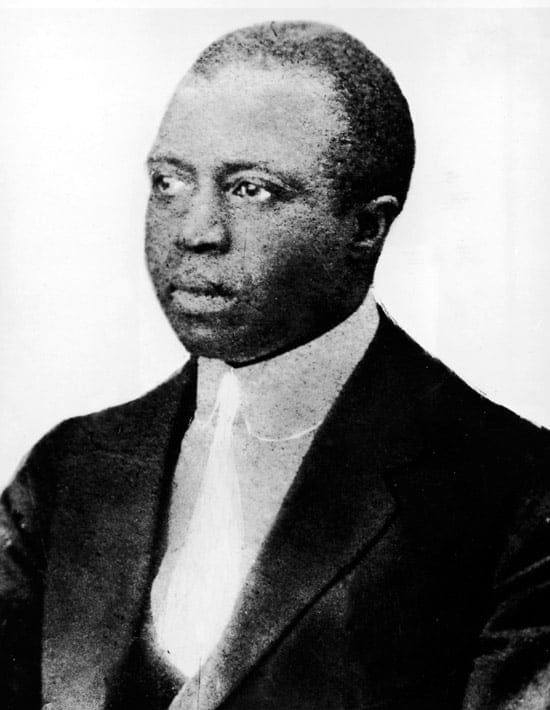Get ready to swing into the world of Scott Joplin, the “King of Ragtime”! This musical genius created some of the most infectious tunes you’ve ever heard, filled with fancy fingerwork and irresistible rhythms. Let’s dive into his life and music, uncovering some cool facts that will make you appreciate his awesomeness even more. From his famous numbers to his mysterious last words, and from his personal life to his lasting impact, we’re about to uncover the story of the man who made ragtime a legend.
Facts About Scott Joplin
Scott Joplin wasn’t just a musician; he was the “King of Ragtime.” This guy didn’t just dabble in ragtime, he lived it, composing over 40 pieces, including one ragtime ballet and two operas! Talk about dedication!
You’ve probably heard of his most famous tune, “Maple Leaf Rag” – it’s the one that brought ragtime to prominence across America. But Joplin wanted more than just catchy tunes; he saw ragtime as something special, a true classical art form. He fought hard to separate it from the rowdy reputation of honky-tonk music.
Sadly, Joplin faced a lot of discrimination back then, which makes his story even more powerful. He never lived to see it, but years later, his incredible talent was recognized with a Pulitzer Prize. Now that’s respect! His impact continues to be felt today as his music was rediscovered in the 1970s, solidifying his influence as a prominent American composer.
What made Joplin’s music so unique? He was a musical innovator, a true pioneer. He wasn’t afraid to experiment with complex elements like syncopation and polyphony, adding layers and intricacies to his ragtime compositions.
What Are Some Interesting Facts About Scott Joplin?
So, we’ve talked about Scott Joplin’s incredible impact on music, but what else made him so fascinating? Well, for starters, his journey wasn’t always easy. Imagine being a young, African-American musician in the late 1800s – talk about facing some serious challenges! But Joplin didn’t let prejudice hold him back. His passion for music burned bright, fueled by early experiences with the lively tunes of minstrel shows and the soulful melodies of church hymns.
Picture this: Joplin, barely a teenager, already showing off some serious piano skills. He wasn’t just playing other people’s music though; this kid was composing his own pieces! Talk about a natural talent! And speaking of talent, let’s talk about “The Entertainer” – you know, that ragtime masterpiece. It wasn’t just a hit; it became the anthem of ragtime, solidifying Joplin’s place in music history.
But Joplin’s dreams went beyond even the catchiest ragtime tunes. He envisioned a world where ragtime was elevated to the same level as opera – no small feat! He poured his heart and soul into composing two operas, showcasing his deep appreciation for classical music woven into the fabric of ragtime.
Sadly, Joplin’s genius wasn’t fully appreciated during his lifetime. The world wasn’t quite ready to embrace the full scope of his vision. But here’s the thing about true artistry: it has a way of finding its way back into the light. Years after his death, Joplin was awarded a Pulitzer Prize, a testament to the enduring power of his music.
And that legacy? It’s still going strong! Today, Joplin’s music continues to captivate audiences worldwide, inspiring musicians across genres and reminding us that true innovation knows no bounds.
What is Scott Joplin’s most famous piece?
You know how some musicians just become synonymous with a specific style of music? That’s Scott Joplin and ragtime for you. While he composed a collection of fantastic pieces, there’s one that really takes the cake (or should we say, the rag?) when it comes to fame: “Maple Leaf Rag.”
Published back in 1899, this piece wasn’t just a hit; it practically launched Joplin into stardom and is considered the quintessential ragtime piece. Imagine complex rhythms and catchy syncopations – that’s the magic Joplin brought to life in “Maple Leaf Rag.” It’s no wonder the piece took the world by storm, making ragtime the music to listen to and solidifying Joplin’s title as the “King of Ragtime.” Even today, “Maple Leaf Rag” continues to enchant listeners and inspire musicians, a testament to its timeless appeal.
Although we can’t be 100% certain why “Maple Leaf Rag” resonated so deeply with audiences at the time, some music historians suggest that its unique blend of catchy melody and complex rhythmic structure was something entirely fresh and exciting in the music scene. This combination, coupled with Joplin’s masterful composition, likely led to its widespread popularity.
It’s also worth noting that the popularity of “Maple Leaf Rag” coincided with a growing interest in ragtime music across the United States. This “perfect storm” of artistic innovation and cultural trends likely contributed to the piece’s enduring legacy.
But “Maple Leaf Rag” isn’t just a historical artifact. It’s a piece of music that continues to be performed and enjoyed by millions around the world. Whether you’re a seasoned musician or a casual listener, there’s no denying the infectious energy and timeless charm of this ragtime masterpiece. It’s a piece that reminds us of the power of music to transcend time and connect with us on a deeply human level.
What Were Scott Joplin’s Last Words?
Sadly, Scott Joplin’s life ended on a somber note. In 1917, after years of grappling with the debilitating effects of neurosyphilis, he reportedly uttered the heartbreaking words, “I’m tired of livin’.” This glimpse into his final moments reveals the immense toll the disease took on him, both physically and emotionally. It’s a poignant reminder of the struggles he faced in his later years.
Despite his difficult ending, Joplin left behind a musical legacy that continues to resonate with people around the globe. Known as the “King of Ragtime,” he gifted the world with over 40 ragtime compositions, including the immensely popular “Maple Leaf Rag.” This iconic piece, along with his other works, cemented his place as a pivotal figure in the history of American music.
Joplin’s journey was not without its challenges. As an African American musician navigating a racially prejudiced society, he encountered numerous obstacles throughout his career. Yet, his sheer talent and unwavering determination allowed him to break down barriers, paving the way for future generations of African American artists. He became a beacon of hope and inspiration, proving that music could transcend racial boundaries.
What made Joplin’s music so special was his ability to seamlessly blend classical elements with distinctly African American musical influences. This unique fusion elevated ragtime to new heights, transforming it into a more sophisticated and expressive genre. He didn’t just compose music; he crafted intricate tapestries of sound that captured the spirit of his time.
Even today, decades after his passing, Joplin’s compositions continue to captivate and inspire musicians and music lovers worldwide. His innovative approach to ragtime, his ability to infuse his music with both joy and melancholy, and his unwavering pursuit of artistic excellence have solidified his legacy as a true musical innovator.
Did Scott Joplin have a wife?
You bet he did! Scott Joplin, the “King of Ragtime,” wasn’t just a musical genius; he also had a pretty interesting personal life. While his melodies captivated audiences, his heart led him to the altar not once, not twice, but three times! Now, you might be thinking, “Three wives? That’s quite a few!” And you’d be right!
Joplin’s first marriage was to a woman named Belle Jones. Unfortunately, like some melodies that fade too soon, this marriage ended in divorce. But Joplin wasn’t one to give up on love. He found it again with Freddie Alexander, and they tied the knot in 1904. Sadly, this union was tragically cut short when Freddie passed away shortly after their wedding.
Love, however, has a way of finding its way back, and Joplin’s heart healed once more. He went on to marry Lottie Stokes, and they remained together until his passing. It seems Joplin, much like his vibrant ragtime tunes, had a knack for finding love even amidst life’s unpredictable rhythms.
While we know the names of his wives, the details of Joplin’s marriages remain a bit of a mystery. Records from that era weren’t as detailed as they are today, leaving us to piece together the story from fragmented information. But, isn’t there a certain charm in a bit of mystery? It allows us to imagine the stories behind the facts, adding another layer to the legacy of a man who, through his music and his life, continues to fascinate us.
If you’re curious to delve deeper into the world of Scott Joplin, numerous biographies and resources explore his life and music in greater detail. Happy exploring!
What is Joplin Best Known For?
So, we’ve talked about Scott Joplin’s life and the challenges he faced. But what really cemented his place in music history? What is he most remembered for? Well, it’s his incredible talent for ragtime music. You see, Joplin didn’t just play ragtime – he’s considered a pioneer of the genre, taking it to new heights with his distinct integration of classical music with influences from African-American musical traditions.
Imagine blending the structured elegance of classical music with the soulful rhythms of Black traditions – that’s what Joplin did, and it was revolutionary! He truly earned the nickname “King of Ragtime,” especially with his most famous piece, “Maple Leaf Rag,” becoming the ragtime anthem.
He wrote over 40 ragtime pieces in his lifetime. Some experts believe these pieces weren’t just catchy tunes, they were like musical snapshots of life in America at that time. And boy, were they catchy! You’ve probably heard his most famous ones – “Maple Leaf Rag” and “The Entertainer.” They’re those tunes that just get stuck in your head, the ones that make you want to tap your feet and dance, even if you have two left feet!
Those two pieces alone made him a star. People started calling him the “King of Ragtime,” and for good reason! Joplin’s music wasn’t just fun to listen to; it was revolutionary. It helped to break down barriers in the music industry by blending Black and white musical styles in a way that no one had really done before.
His success opened doors for other African American musicians who were struggling to be heard. It’s hard to imagine now, but back then, it wasn’t easy for Black artists to get recognition. Joplin’s talent was undeniable, and his success helped to pave the way for greater diversity and acceptance in the music world.
Even today, almost a century after his death, Joplin’s music continues to resonate with people. His rags are still played and enjoyed by millions around the world. He left behind a legacy that continues to inspire musicians and music lovers alike. Whenever you hear that infectious ragtime rhythm, remember the name Scott Joplin – the King of Ragtime, the innovator, the legend!
What is Scott Joplin remembered for?
So, we’ve talked about Scott Joplin’s life, but what about his legacy? What exactly made him so important in the world of music?
Well, you can’t talk about Joplin without talking about ragtime. He’s considered a pioneer of the genre, taking it to new heights with his compositions. He was a cultural icon who challenged racial barriers during a time when it was incredibly tough to do so. His success as a Black composer in a predominantly white musical landscape was a beacon of hope and inspiration for generations of African-American musicians who came after him. He showed the world that ragtime was more than just a passing fad; it was a legitimate art form deserving of respect and recognition.
What’s remarkable about Joplin is that he didn’t just stick to a formula. He was constantly experimenting and pushing the boundaries of ragtime. He played with syncopated rhythms, explored unusual harmonies, and wasn’t afraid to experiment with different musical forms. He was an innovator who helped shape the sound of American music in a way that few others have.
The amazing thing about Joplin’s music is that it continues to resonate with people even today, long after his passing. It’s a testament to his genius and the lasting power of his creativity. And the accolades keep coming! Years after his death, he was even awarded a Pulitzer Prize, further cementing his place as a true musical pioneer.
Uncover enigmatic facts about Plutarco Elias Calles, a figure shrouded in mystery whose life and legacy continue to captivate historians. Dive into the intriguing facts about Wang Chuanfu, the visionary entrepreneur who transformed the automotive industry and reshaped China’s economic landscape. Explore the fascinating facts about Andrei Arlovski, a formidable fighter whose indomitable spirit and technical prowess have left an indelible mark on the world of mixed martial arts.
- Unlocking Francis Alexander Shields’ Finance Empire: A Comprehensive Biography - July 12, 2025
- Unveiling Francis Alexander Shields: A Business Legacy - July 12, 2025
- Francis Alexander Shields’ Business Career: A Comprehensive Overview - July 12, 2025
















3 thoughts on “Unveiling the Ragtime King: Fascinating Facts About Scott Joplin”
Comments are closed.